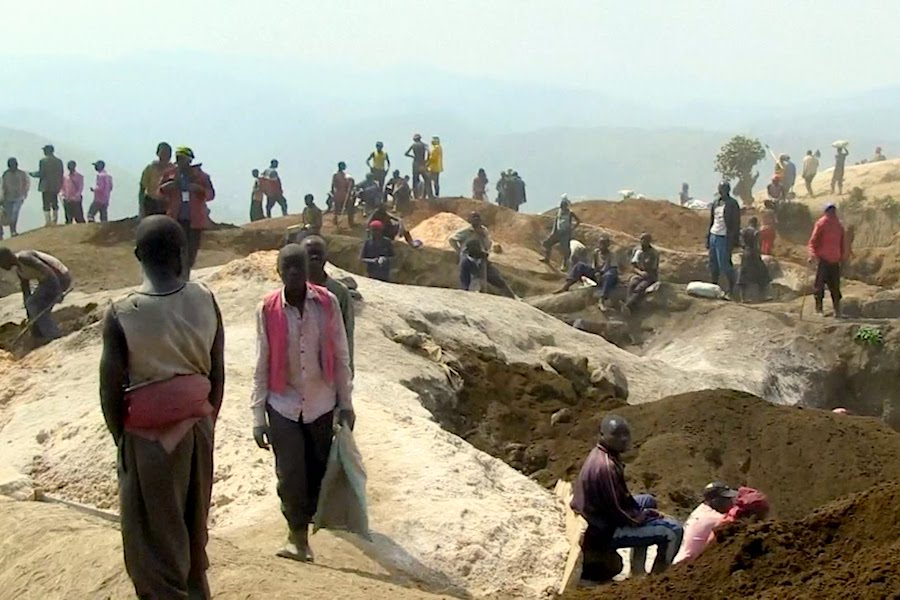Global S&T Development Trend Analysis Platform of Resources and Environment
| Renewables sector falling short on human rights | |
| admin | |
| 2020-06-28 | |
| 发布年 | 2020 |
| 语种 | 英语 |
| 国家 | 国际 |
| 领域 | 地球科学 |
| 正文(英文) |  Companies active in the making of electric vehicles, (EVs) batteries, solar panels and other green technologies have been linked to alleged human rights abuses. (Image: Illegal coltan miners in DRC. Courtesy of Boston University | YouTube.)
The ongoing and global transition to renewable energies is not exempt of human rights abuses, which could create risks in a sector vital to countering the climate crisis, the first benchmark of companies in the sector, published Monday, shows. According to UK-based Business & Human Rights Resource Centre (BHRRC), the authors of the benchmark, the renewable energy industry has seen a rise in claims of human rights violations. At least 197 allegations against green energy companies have been filed since 2010, with 40 of them registered last year.
Those allegations, the watchdog says, include killings, threats and land grabs. They prove that efforts to protect workers and communities are falling short, it notes. “Renewable energy will play a pivotal role in ‘building back better’ following the covid-19 pandemic,” says BHRRC deputy director Marti Flacks. “This makes it even more crucial that the renewable energy sector avoid the mistakes of other energy providers and urgently build respect for human rights in their operations and supply chains.” The company analyzed 16 of the largest publicly-traded wind and solar producers using a methodology developed through seven global consultations, involving more than 100 stakeholders. The lower the score, the more work companies have to do to ensure respect for human rights in their operations and through their supply chains. Firms analyzed include Enel, Blackrock, NextEra, Jinko Solar, China General Nuclear Power Corp, and PowerChina, among others. The study concluded that nearly half (7/16) of the firms scored below 10%, with three quarters (12/16) scoring below 40%. No entities scored above 53%. On the most important indicators, the sector’s average score was on par with other high-risk industries, such as apparel, agricultural products, mining and ICT manufacturing, the NGO said.
It doesn’t include original documents nor full transcriptions of court cases against companies. Instead, it just links to either media reports on an alleged abuse or to research by other NGOs working in the field, such as Amnesty International. Land useOne of the most pressing issues, BHRRC says, is related to land-use as some projects have threatened environmentally sensitive areas land utilized by indigenous people. Examples include a wind farm in Norway challenged by reindeer-herders over loss of land; a solar park in Mexico sued over lack of community consent, and a wind farm in Kenya cancelled after lawsuits by farmers and local landowners. Good practice in the sector does exist, such as a wind farm in Mexico owned by the indigenous community, a wind farm project in South Africa that consulted with local communities about jobs and part-ownership of the project, and wind and solar projects in Canada owned by indigenous groups. BHRRC’s benchmark outlines policy and practice gaps the sector should address to ensure the transition to a net zero-carbon economy is both fast and fair. The Renewable Energy and Human Rights Benchmark uses 13 core indicators from the Corporate Human Rights Benchmark to assess companies against the United Nations Guiding Principles on Business and Human Rights (UNGPs). It uses a further 19 indicators developed to assess risks specific to the renewable energy industry. |
| URL | 查看原文 |
| 来源平台 | Minging.com |
| 文献类型 | 新闻 |
| 条目标识符 | http://119.78.100.173/C666/handle/2XK7JSWQ/278404 |
| 专题 | 地球科学 |
| 推荐引用方式 GB/T 7714 | admin. Renewables sector falling short on human rights. 2020. |
| 条目包含的文件 | 条目无相关文件。 | |||||
| 个性服务 |
| 推荐该条目 |
| 保存到收藏夹 |
| 查看访问统计 |
| 导出为Endnote文件 |
| 谷歌学术 |
| 谷歌学术中相似的文章 |
| [admin]的文章 |
| 百度学术 |
| 百度学术中相似的文章 |
| [admin]的文章 |
| 必应学术 |
| 必应学术中相似的文章 |
| [admin]的文章 |
| 相关权益政策 |
| 暂无数据 |
| 收藏/分享 |
除非特别说明,本系统中所有内容都受版权保护,并保留所有权利。
修改评论